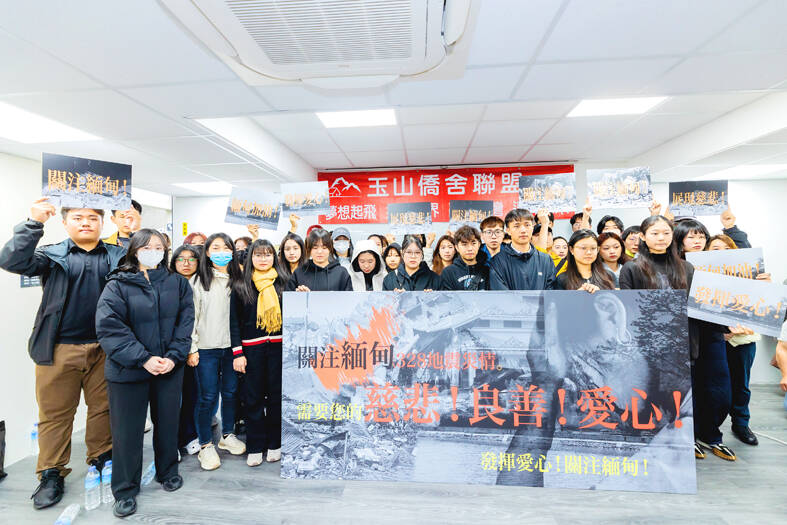As images of destroyed buildings in earthquake-hit Myanmar flashed across her television screen in Taiwan, Yang Bi-ying could only weep for her family there.
Yang, 76, has lived in Taiwan for more than half her life and has a daughter-in-law in the central Myanmar city of Mandalay, which was devastated by Friday’s massive earthquake.
At least 1,700 people have been killed in Myanmar and neighboring Thailand, and hopes of finding more survivors are fading fast.

Photo courtesy of the Burmese student group in Taiwan
Yang said her daughter-in-law was safe and other relatives in Yangon were unaffected by the magnitude 7.7 earthquake and its aftershocks.
“I could only cry. There was nothing else, just tears,” said the grandmother at an eatery in a Sino-Burmese neighbourhood near Taipei.
“Every family has been worried, especially for those buried under the rubble. What could be done? Nothing. It’s all in the hands of fate,” she said.
Three days after the quake struck, many in Taiwan’s Sino-Burmese community still feared for their loved ones.
“Several buildings near my family’s home collapsed, many people died,” said eatery owner Yeh Mei-chin, 48, showing a video of the damage on her smartphone.
It took hours before Yeh was able to reach her mother and sisters in Mandalay on Friday. They were safe, but too scared to go home.
“I asked them where they would sleep that night, and they said they were still looking for a place, but hadn’t found one yet,” Yeh said.
People in Taiwan have been using social media platforms, including Line and WeChat, to contact family in Myanmar and monitor the situation, but Internet connection has been intermittent.
“On a lucky day, we may be able to get through a few times,” Myanmar Overseas Chinese Association Lee Pei, 66, said. “Usually, we can only leave messages as voice calls rarely go through. If we do manage to connect, the signal deteriorates after a few words.”
The Myanmar community in Taiwan dates back to the end of the Chinese Civil War in 1949.
Many members of former president Chiang Kai-shek’s (蔣介石) defeated Nationalist forces fled across the border to Myanmar and later went to Taiwan. Over the decades, students and people fleeing anti-Chinese sentiment as well as economic and political turmoil in Myanmar have followed.
Pei estimated Taiwan’s Sino-Burmese population at 160,000 and said 10 percent were originally from Mandalay.
University student Aung Kyaw Zaw has been following developments on Facebook where he has seen reports that in Sagaing, near the quake’s epicenter, there was a “stench ... like the smell of decaying bodies.”
The 24-year-old said he had exchanged messages with some friends in quake-hit areas, but “some of them still haven’t come online.”
There were also concerns that donations sent to Myanmar would not reach the people who need it.
“The junta only cares about fighting wars or other things, but they don’t really do much to help the people,” university student Yi Chint, 24, said. “I think very little of it would actually go to the people.”

TRAFFIC SAFETY RULES: A positive result in a drug test would result in a two-year license suspension for the driver and vehicle, and a fine of up to NT$180,000 The Ministry of Transportation and Communications is to authorize police to conduct roadside saliva tests by the end of the year to deter people from driving while under the influence of narcotics, it said yesterday. The ministry last month unveiled a draft of amended regulations governing traffic safety rules and penalties, which included provisions empowering police to conduct mandatory saliva tests on drivers. While currently rules authorize police to use oral fluid testing kits for signs of drug use, they do not establish penalties for noncompliance or operating procedures for officers to follow, the ministry said. The proposed changes to the regulations require

Taipei, New Taipei City, Keelung and Taoyuan would issue a decision at 8pm on whether to cancel work and school tomorrow due to forecasted heavy rain, Keelung Mayor Hsieh Kuo-liang (謝國樑) said today. Hsieh told reporters that absent some pressing reason, the four northern cities would announce the decision jointly at 8pm. Keelung is expected to receive between 300mm and 490mm of rain in the period from 2pm today through 2pm tomorrow, Central Weather Administration data showed. Keelung City Government regulations stipulate that school and work can be canceled if rain totals in mountainous or low-elevation areas are forecast to exceed 350mm in

1.4nm WAFERS: While TSMC is gearing up to expand its overseas production, it would also continue to invest in Taiwan, company chairman and CEO C.C. Wei said Taiwan Semiconductor Manufacturing Co (TSMC) has applied for permission to construct a new plant in the Central Taiwan Science Park (中部科學園區), which it would use for the production of new high-speed wafers, the National Science and Technology Council said yesterday. The council, which supervises three major science parks in Taiwan, confirmed that the Central Taiwan Science Park Bureau had received an application on Friday from TSMC, the world’s largest contract chipmaker, to commence work on the new A14 fab. A14 technology, a 1.4 nanometer (nm) process, is designed to drive artificial intelligence transformation by enabling faster computing and greater power

China Airlines Ltd (CAL) yesterday morning joined SkyTeam’s Aviation Challenge for the fourth time, operating a demonstration flight for “net zero carbon emissions” from Taiwan Taoyuan International Airport to Bangkok. The flight used sustainable aviation fuel (SAF) at a ratio of up to 40 percent, the highest proportion CAL has achieved to date, the nation’s largest carrier said. Since April, SAF has become available to Taiwanese international carriers at Taipei International Airport (Songshan airport), Kaohsiung International Airport and Taoyuan airport. In previous challenges, CAL operated “net zero carbon emission flights” to Singapore and Japan. At a ceremony at Taoyuan airport, China Airlines chief sustainability